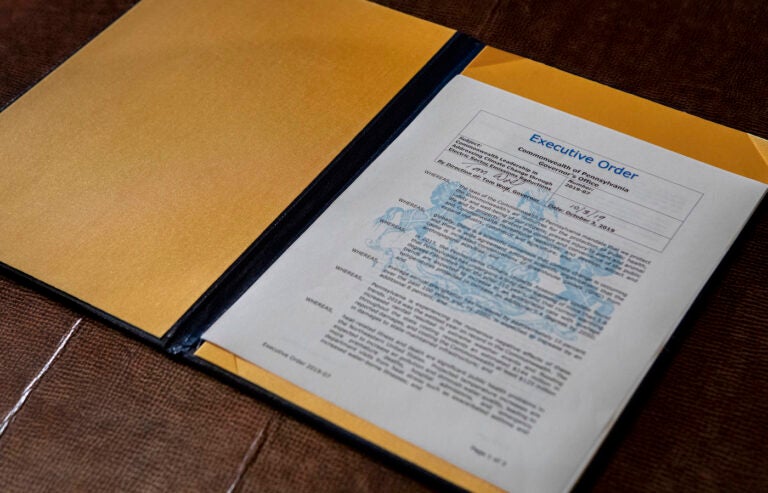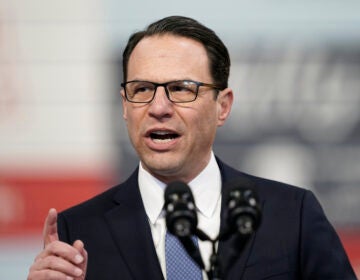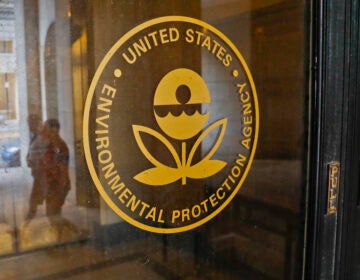Shapiro isn’t sold on a key climate program, and his working group isn’t either. What’s next for RGGI?
A group appointed by Gov. Shapiro believes a cap-and-trade program would help meet his ambitious climate goals, although the members lacked consensus on how best to proceed.

The executive order former Gov. Tom Wolf signed directing Pennsylvania’s environmental department to enter RGGI. (Commonwealth Media Services)
This story originally appeared on Spotlight PA.
From almost the beginning of the Shapiro administration, top aides to the Democratic governor were looking for “RGGI alternatives,” emails show.
RGGI refers to the Regional Greenhouse Gas Initiative, a multistate effort to fight climate change that Josh Shapiro faced numerous questions about during his campaign.
While he promised to steeply cut carbon emissions, Shapiro wouldn’t commit to keeping Pennsylvania in the program, citing concerns about losing jobs to other states, and higher energy prices.
Emails obtained by Spotlight PA through a public records request show Mike Vereb, a top Shapiro aide who recently resigned amid sexual harassment allegations, discussed this conundrum in April with an oil and gas lobbyist.
Delay, the lobbyist advised, until more neighboring states commit to cap-and-trade programs and level the playing field.
A working group convened by Shapiro made essentially the same recommendation in a four-page memo released last month. What the group didn’t deliver to the governor was an elusive silver bullet, punting the question of whether Shapiro will support RGGI further into the future.
As the state waits for critical court rulings, the commonwealth’s disparate energy, labor, and environmental interests are discussing what comes next.
No ‘consensus’ on RGGI
The RGGI Working Group was tasked with measuring RGGI or an alternative against a three-part test: “protect and create energy jobs”; “take real action to address climate change”; and “ensure reliable, affordable power for consumers in the long-term.” Its members included lobbyists for the energy and labor industries, and consumer and environmental advocates.
There was “consensus” that a cap-and-trade regulation would meet those goals, the memo said, though the entire group did not agree that RGGI is the correct program to accomplish that. While the working group did not specify why some of its members oppose RGGI, it did catalog wider concerns regarding increased energy costs and job loss.
Environmentalists who broadly support the initiative were pleased with the findings despite the memo not quite endorsing RGGI.
“This is a historic level of consensus,” said Robert Routh, an attorney with the National Resources Defense Council who studies decarbonization efforts in Pennsylvania. “This has been productive and moved the ball forward, not just on RGGI, which is a key pillar, but thinking about a broader energy policy portfolio.”
Not all members of the working group agreed with the memo’s findings.
“I wouldn’t say there was a consensus on cap and trade or RGGI,” said Rob Bair, who heads the Pennsylvania Building & Construction Trades Council. “I would say the door was left open from the energy sector and even labor that a [federal program that includes neighboring states] … which leveled the playing field for everybody would be an option.”
Bair added that the memo emphasizes that any further policy on energy and the environment should be decided by lawmakers.
Republicans in the state legislature have made that same argument since former Democratic Gov. Tom Wolf unilaterally had Pennsylvania join RGGI. GOP leaders eventually filed a lawsuit against the state, claiming executive overreach.
State Sen. Gene Yaw (R., Lycoming), who chairs the GOP-controlled state Senate’s Environmental Resources and Energy Committee, called the memo “lacking.” He said that he would prefer for an independent office to provide energy policy guidance, and would like the legislature to be tasked with balancing energy and environmental policy.
“Clearly, despite the good intentions of the RGGI working group, there remains significant disagreement over the structure of a cap-and-tax program and need for legislative enactment,” Yaw said in a press release.
Cap-and-trade programs limit the amount of carbon dioxide emissions that companies can produce. If companies and other entities want to emit more than their cap, they can buy and sell allowances, and the revenue from those sales can be reinvested into the state.
RGGI creates such a market for a dozen states in the northeast, including Maryland and New Jersey. Wolf signed an executive order in 2019 directing Pennsylvania’s Department of Environmental Protection to join.
While the state officially joined the consortium in 2022, it has been unable to participate in carbon credit auctions due to an injunction from Commonwealth Court. That case is currently before the state Supreme Court, while two other legal challenges are pending in a lower court.
Critics of RGGI argue that it puts Pennsylvania at risk of losing jobs to energy-producing neighbors like Ohio or West Virginia, who aren’t members and would allow companies to emit greenhouse gasses without cost. They also argue that the additional costs companies will pay to release more carbon dioxide will be transferred to consumers via utility rate hikes.
Economic and environmental studies examining the impact of RGGI on utility costs have had mixed results. Some reports have found that costs would go up for consumers, while others have concluded that costs would remain the same.
While Wolf’s administration staunchly defended the program, Shapiro has taken a more neutral stance. Emails obtained by Spotlight PA through a Right-to-Know request show that the new administration began looking for “RGGI alternatives” as early as February.
In an April email to a Shapiro aide, oil, gas, and coal lobbyist Peter Gleason wrote that he would “attempt to ferret out the RGGI ‘alternative’” they had discussed that day. (Gleason, whose clients include GE Energy and Olympus Power, helped state lawmakers draft a letter opposing RGGI in 2021, emails obtained by the Energy and Policy Institute show.)
He told the aide, Mike Vereb, that an alternative would require at least two conditions. One, the legislature would need to delay the date that Pennsylvania began participating in RGGI carbon credit auctions.
Two, it would need to make sure that all states that draw on the energy grid maintained by PJM Interconnection had joined RGGI, or at a minimum had adopted an equal carbon tax.
A possible — but unlikely — alternative
The working group echoed that recommendation.
It suggested the Shapiro administration explore a cap-and-trade program that includes Washington, D.C., and the 13 states whose electric grids are run by PJM Interconnection, and encourage each PJM state to “reach a consensus on regional carbon trading.”
More than half of the states served by PJM are not a part of RGGI, including Indiana, Kentucky, Ohio, and West Virginia.
While a cap-and-trade agreement with all PJM states might assuage concerns about jobs and market competition, the working group wrote that such an agreement “would take significant time to pursue,” and “the adoption of such an approach is far from certain.”
PJM could implement its own carbon pricing scheme across its network, although such a plan would need approval from the Federal Energy Regulatory Commission and each participating state’s government, according to a spokesperson.
Though PJM has studied the impact of carbon pricing, it has never recommended such a policy. When asked if PJM would ever implement such a program on its own accord, a representative told Spotlight PA, “We stand ready to work with Gov. Shapiro to help facilitate Pennsylvania policy while maintaining a reliable and cost effective grid.”
Others are hesitant that a PJM-wide cap is possible because it would require the cooperation of over a dozen states, some of which have indicated they do not support carbon pricing and which lack emission reduction goals.
Yaw called the idea “unrealistic.”
Climate advocates echoed Yaw, saying that they were not against the idea but wanted to see more immediate action.
“We know we need to act now and doing something PJM-wide isn’t something that can happen tomorrow,” said Katie Blume, the legislative director of Conservation Voters of PA. “I think we have an opportunity immediately to capitalize on the proceeds of RGGI auctions while we are still talking about other things.”
What’s next
During his campaign, Shapiro said his climate goals include reaching net-zero emissions by 2050 and increasing state clean energy production from 8% to 30% by 2030. Environmental advocates say that these goals go hand in hand.
Energy generation, transportation, and industry are Pennsylvania’s largest sources of emissions — largely from the combustion of fossil fuels.
There are many policy options for cutting emissions, from tax credits for people who purchase electric vehicles to funding for community solar programs. But supporters of RGGI argue it offers some additional benefits.
RGGI not only limits the amount of emissions that energy producers are able to generate; it also brings in revenue from the sale of carbon credits, which advocates say can be used to further fund emission-reduction projects.
The initiative’s future in Pennsylvania depends in part on the state Commonwealth and Supreme Courts, which have yet to rule on a number of challenges to the program.
If the courts rule in favor of Wolf’s action, Shapiro could move forward with credit auctions or choose to pull Pennsylvania out of RGGI.
In a statement, a Shapiro spokesperson said the governor had delivered on his promise to bring disparate groups together for a “constructive dialogue.”
“Our Administration will review the working group’s full set of recommendations as we await the Commonwealth Court decision on Pennsylvania’s participation in RGGI,” the spokesperson said.
Should the courts rule against the administration, Pennsylvania would no longer be part of RGGI, and any kind of carbon pricing in the future would require legislative approval.
Finding enough common ground to pass a bill would be difficult in the divided legislature.
Following the release of the working group’s memo, state Senate Majority Leader Joe Pittman (R., Indiana) called on Shapiro to pull out of RGGI.
“Touting his achievement of putting together this group is noted, but the question remains: What will Gov. Shapiro do now that his working group has completed their task?” Pittman said in a statement. “If the governor is so eager to accept their recommendations, he should immediately withdraw our commonwealth from RGGI and look for a legislative solution which respects the need for family sustaining jobs, and positively impacts Pennsylvania’s economy.”
Spotlight PA’s Stephen Caruso contributed reporting.
 Spotlight PA is an independent, nonpartisan, and nonprofit newsroom producing investigative and public-service journalism that holds the powerful to account and drives positive change in Pennsylvania.
Spotlight PA is an independent, nonpartisan, and nonprofit newsroom producing investigative and public-service journalism that holds the powerful to account and drives positive change in Pennsylvania.

Get daily updates from WHYY News!
WHYY is your source for fact-based, in-depth journalism and information. As a nonprofit organization, we rely on financial support from readers like you. Please give today.





